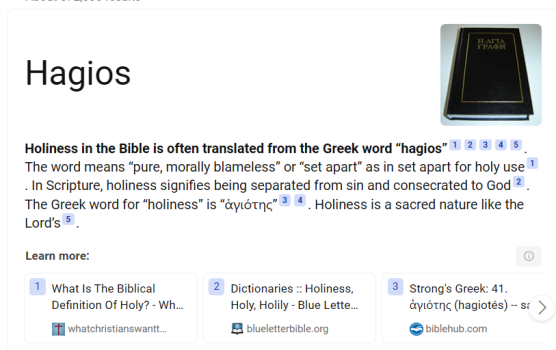"Verse 12. Not as though I had already attained. For I have not yet received the prize; for I have not finished my course; and I have a conflict still to maintain, and the issue will prove whether I should be crowned. From the beginning of the 11th to the end of the 17th verse there is one continued allusion to the contests at the Olympic Games; exercises with which, and their laws, the Philippians were well acquainted. Philippians 3:11-17
Here’s what I have gathered and gleaned from studying this passage,
@Hepzibah and brother
@marks. Apologies for tagging you, but I’d love to know if you’re in agreement with this exegesis of the verse.
Paul's words in Philippians 3:12 and the surrounding verses use vivid language and grammatical constructions that draw upon the metaphor of athletic competition, particularly from the context of the Olympic Games.
Philippians 3:12 (Textus Receptus):
"Οὐχ ὅτι ἤδη ἔλαβον ἢ ἤδη τετελείωμαι, διώκω δὲ εἰ καὶ καταλάβω, ἐφ' ᾧ καὶ κατελήφθην ὑπὸ Χριστοῦ Ἰησοῦ."
(
"Not as though I had already attained, either were already perfect: but I follow after, if that I may apprehend that for which also I am apprehended of Christ Jesus.")
Php 3:4 though I also have cause of trust in flesh. If any other one doth think to have trust in flesh, I more;
Php 3:5 circumcision on the eighth day! of the race of Israel! of the tribe of Benjamin! a Hebrew of Hebrews! according to law a Pharisee!
Php 3:6 according to zeal persecuting the assembly! according to righteousness that is in law becoming blameless!
Php 3:7 But what things were to me gains, these I have counted, because of the Christ, loss;
Php 3:8 yes, indeed, and I count all things to be loss, because of the excellency of the knowledge of Christ Jesus my Lord, because of whom of the all things I suffered loss, and do count them to be refuse, that Christ I may gain, and be found in him,
Php 3:9 not having my righteousness, which is of law, but that which is through faith of Christ—the righteousness that is of God by the faith,
Php 3:10 to know him, and the power of his rising again, and the fellowship of his sufferings, being conformed to his death,
Php 3:11 if anyhow I may attain to the rising again of the dead.
Php 3:12
Not that I did already obtain, or have been already perfected; but I pursue, if also I may lay hold of that for which also I was laid hold of by the Christ Jesus;
I have already obtained (ēdē elabon). Rather, “I did already obtain,” constative second aorist active indicative of lambanō, summing up all his previous experiences as a single event.
Or am already made perfect (ē ēdē teteleiōmai). Perfect passive indicative (state of completion) of teleioō, old verb from teleios and that from telos (end).
Paul pointedly denies that he has reached a spiritual impasse of non- development. Certainly he knew nothing of so-called sudden absolute perfection by any single experience.
Paul has made great progress in Christlikeness, but the goal is still before him, not behind him.
But I press on (diōkō de). He is not discouraged, but encouraged. He keeps up the chase (real idea in diōkō, as in 1Co_14:1; Rom_9:30; 1Ti_6:11).
If so be that (ei kai). “I follow after.” The condition (third class, ei̇̇katalabō, second aorist active subjunctive of katalambanō) is really a sort of purpose clause or aim. There are plenty of examples in the Koiné[28928]š of the use of ei and the subjunctive as here (Robertson, Grammar, p. 1017), “if I also may lay hold of that for which (Ephesians' hōi, purpose expressed by epi) I was laid hold of (katelēmphthēn, first aorist passive of the same verb katalambanō) by Christ Jesus.”
His conversion was the beginning, not the end of the chase.
VWP.
However-putting Vincent to the test--
ἔλαβον is indeed the second aorist active indicative of λαμβάνω (lambanō, "to take/receive"), and it refers to a completed action.
However, translating it as
"I did already obtain" is somewhat awkward in English.
The aorist here negates any claim of completed attainment ("Not as though I have already attained"). While the aorist can summarize an action as a single whole, it does not require a "constative" function in this context.
The idea is that Paul is explicitly denying that he has already achieved the goal of full spiritual attainment or final salvation.
Be cautious when describing the
aorist tense as "constative" in this context. While it can summarize an action as a whole,
the primary point here is negation rather than summation of prior events.
The connection between Paul's denial of perfection and his continual striving could be expanded with more emphasis on the broader theological implications of sanctification as a process rather than a completed state in this life.
Php 3:13 brethren, I do not reckon myself to have laid hold; and one thing—the things behind indeed forgetting, and to the things before stretching forth—
Php 3:14 to the mark I pursue for the prize of the high calling of God in Christ Jesus.
Php 3:15 As many, therefore, as are perfect—let us think this, and if in anything ye think otherwise, this also shall God reveal to you,
As many as be perfect (hosoi teleioi). Here the term teleioi means relative perfection, not the absolute perfection so pointedly denied in Php_3:12. Paul here includes himself in the group of spiritual adults (see Heb_5:13).
Php 3:16 but to what we have come—by the same rule walk, the same thing think;
Php 3:17 become followers together of me, brethren, and observe those thus walking, according as ye have us—a pattern;
Php 3:18 for many walk of whom many times I told you—and now also weeping tell—the enemies of the cross of the Christ!
Php 3:19 whose end is destruction, whose god is the belly, and whose glory is in their shame, who the things on earth are minding.
Php 3:20 For our citizenship is in the heavens, whence also a Saviour we await—the Lord Jesus Christ—
Php 3:21 who shall transform the body of our humiliation to its becoming conformed to the body of his glory, according to the working of his power, even to subject to himself the all things.
1. Key Grammatical and Syntactical Features
οὐχ ὅτι (not that):
This phrase introduces a clarification or disclaimer, negating any false assumption that Paul has already achieved his ultimate goal.
ἤδη ἔλαβον (already attained):
The verb ἔλαβον is in the aorist tense, emphasizing a completed action in the past. Paul denies having fully "attained" his goal, signaling that his ultimate salvation and perfection are yet to be realized.
ἢ ἤδη τετελείωμαι (or were already perfect):
The verb τετελείωμαι is in the perfect tense and passive voice, suggesting a state of completion that results from prior action.
Paul is clarifying that he has not yet reached the state of perfection (spiritual maturity or ultimate sanctification).
διώκω (I follow after):
This verb is in the present tense, indicating continuous, active pursuit. Paul portrays himself as persistently striving toward a goal, much like an athlete pursuing victory in a race.
εἰ καὶ καταλάβω (if I may apprehend):
The verb καταλάβω is in the aorist subjunctive, expressing the possibility or goal of "apprehending" or "grasping" something fully. This shows Paul's hope and effort toward achieving what he has not yet obtained.
ἐφ' ᾧ καὶ κατελήφθην (for which I am apprehended):
The verb κατελήφθην is in the aorist passive, pointing to Christ's decisive act of "apprehending" Paul. This refers to Paul's conversion and calling, where Christ took hold of him for a purpose.
2. Interpretation of the Athletic Imagery
Paul employs the metaphor of an athletic contest, particularly a race, to describe his spiritual journey:
"Not that I have already attained":
Paul acknowledges that the prize (final salvation or resurrection) is not yet in his possession. In the context of the Olympics, this corresponds to not having crossed the finish line or received the victor’s crown.
"I follow after":
This reflects the strenuous effort of a runner pressing toward the goal. The present tense conveys the ongoing nature of this pursuit, emphasizing perseverance and dedication.
"If I may apprehend":
The subjunctive mood implies an uncertainty or contingency,showing that the race is not yet complete and the outcome is not guaranteed. The goal is to grasp fully the purpose for which Christ "apprehended" him, i.e., to be conformed to Christ's image.
"For which I am apprehended by Christ Jesus":
Paul grounds his striving in the prior work of Christ, who initiated the relationship by seizing him. This divine action serves as both the foundation and motivation for Paul's effort.
3. Broader Context (Philippians 3:11–17)
In verse 13, Paul continues: "Brethren, I count not myself to have apprehended: but this one thing I do, forgetting those things which are behind, and reaching forth unto those things which are before." Here, the verbs forgetting and reaching forth reflect the focused determination of an athlete disregarding distractions and stretching toward the finish line.
In verse 14, Paul writes: "I press toward the mark for the prize of the high calling of God in Christ Jesus." The word press (διώκω) reiterates the effort and urgency of the race, and the "prize" (βραβεῖον) is the ultimate reward, akin to the wreath given to victors.
J.



